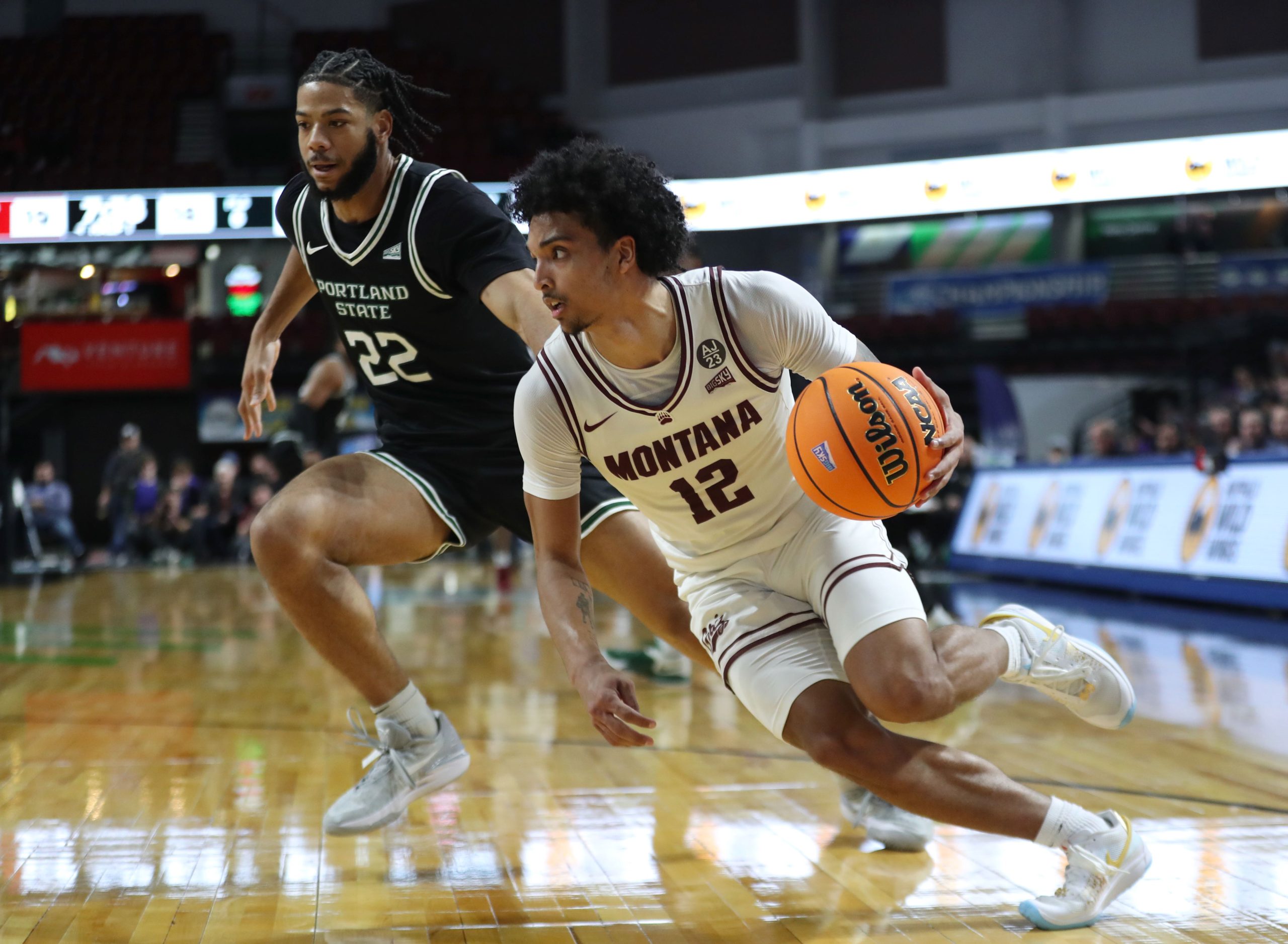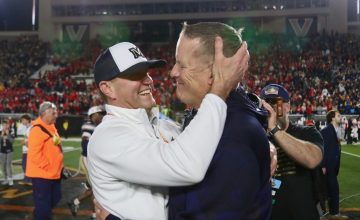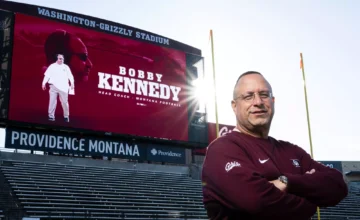It’s no secret that point guard play is a pivotal element of college basketball, especially for teams navigating the stretch run of a conference title race.
The dynamic is particularly true in this year’s Big Sky Conference. Just ask Montana head coach Travis DeCuire, who has not just one but two of the Big Sky’s best point guards. Ever since moving uber-talented sophomore Money Williams to a reserve role that he’s thrived in, allowing Brandon Whitney to be the starting point guard, Montana has been unbeatable in Big Sky Conference play.
“To have a floor general, to have someone that has an understanding of what you are looking for, can execute it, is huge,” DeCuire said. “The most important part of point guard play is the point of attack. They can draw a second defender, which makes offense easier for the others. And they should be able to contain the other point guard and contain the ball on the defensive side of the ball.
“If you have that, you always have a good opportunity to win regardless of the rest of the talent on the floor.”
Williams came off the bench for the first time in UM’s 77-70 win over Montana State in Missoula on January 25. Montana hasn’t lost since, rolling up eight victories in a row to assume sole possession of first place in the Big Sky Conference. The game that actually started the winning streak, a 72-67 win over Idaho, was Williams’ last start, but a stark display of his ability as a facilitator; the Oakland native had nine assists.

“Sometimes, it’s what’s best for the group, who’s playing with who,” DeCuire said of the move to insert senior slasher Kai Johnson into the starting lineup and transform Williams into a super sixth man. “Sometimes, you run different guys on the floor. Sometimes, some guys benefit from watching the first three to four minutes of play to get a feel for what’s going on. Everyone is different but there are benefits. The player has to be confident and selfless enough to be willing to make the most of that.”
The fact is, Whitney and Williams have also learned how to play alongside each other, which has made Montana even tougher to guard. The Griz are one of the most efficient teams in college basketball. They enter Saturday evening’s rivalry game against Montana State in Bozeman on Saturday shooting nearly 50 percent as a team.
Whitney has been steady and has led with great tempo, averaging 8.1 points and 3.1 assists while shooting nearly 52 percent. He has also evolved into Montana’s closer late in games.
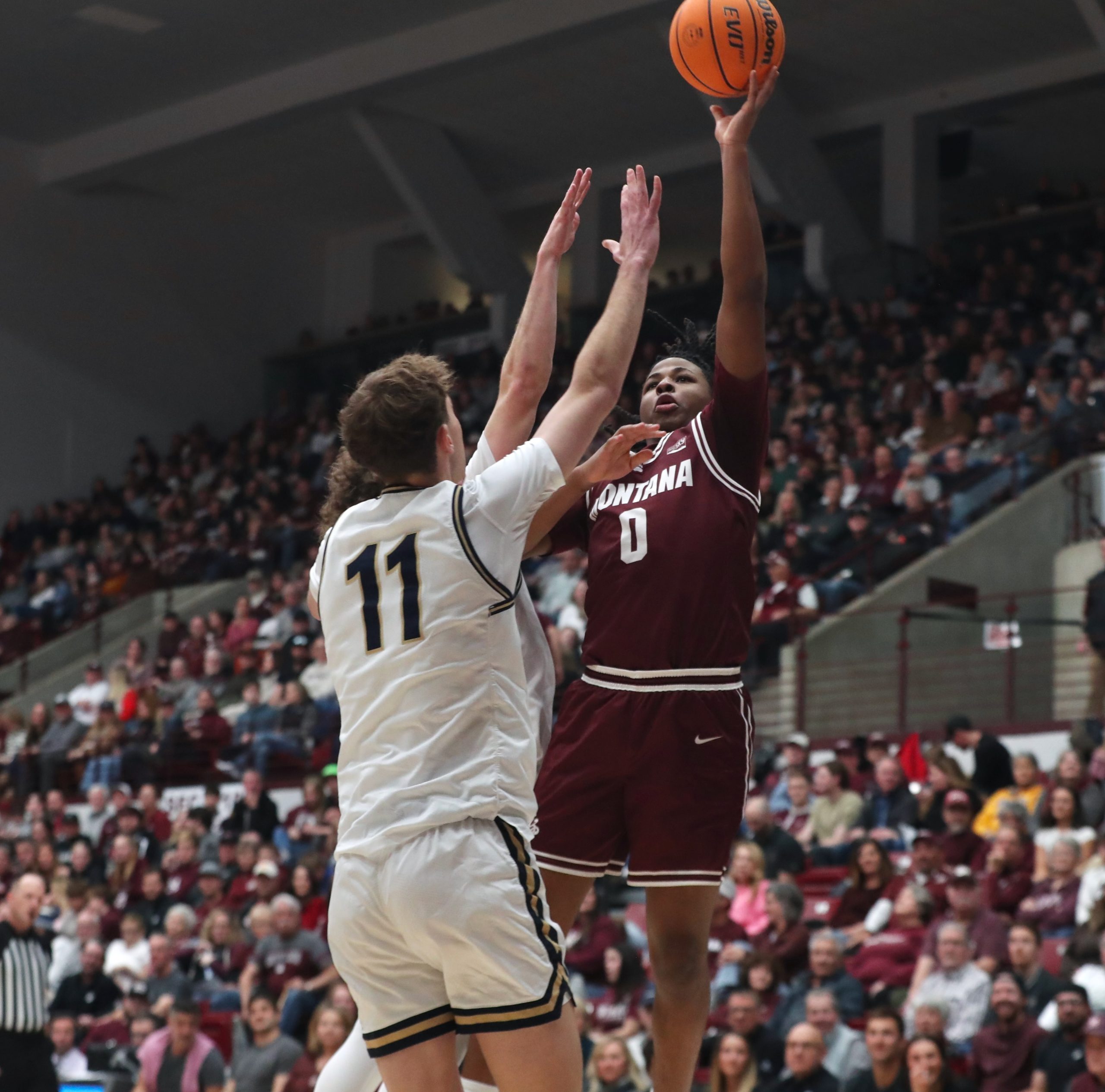
Williams remains one of the most explosive players in the conference. The southpaw can beat pretty much anyone in the league off the dribble and his catch-and-shoot abilities have improved tremendously. He’s shooting 37.3 percent from beyond the arc while averaging 12.7 points and 3.4 assists per game.
Those two are just a part of a well-oiled machine that has the Griz averaging nearly 77 points per game on the way to a 12-2 conference record.
“Growth – we’ve shown a lot of growth in about three weeks in terms of coming together and playing cohesively,” DeCuire said. “Our offensive execution, obviously, has been the biggest area of improvement but I also feel that lately, we have defended well enough to win big games. I like the direction of our team. I think we still have room for growth so the most important thing is to keep looking forward.”
The Griz and Northern Colorado have established themselves as the top two teams in the conference with four games left to play. Northern Colorado moved to 12-3 in league play with an impressive 95-76 win over Eastern Washington.
So much of UNC’s strong season has stemmed from the savvy of veteran super-senior point guard Jaron Rillie. Thursday, he went 9-of-13 from the floor and 4-of-6 from beyond the arc on the way to 23 points. He hauled in 10 rebounds and dished out five assists. The former Samford transfer is averaging 13 points, 5.3 rebounds and 4.4 assists this season.
“The two teams that have separated in the league race in Montana and Northern Colorado have high-level point guard play,” Montana State head coach Matt Logie said. “That’s been consistent in their programs for a long time. A lot of other teams, ourselves included, are putting that puzzle together as we go and sometimes, it clicks earlier than later.”
When it comes to point guard play, you can also ask Logie of the importance. Last season, Logie’s squad raced all the way to the Big Sky Tournament title in his first season behind the otherworldly play of point guard Robert Ford III.

This season, Logie’s team struggled to find flow and consistency, particularly offensively, during a 6-12 start to his second season at the helm. Following a 70-67 loss at Idaho State — MSU’s first loss in Pocatello since 2018 — the Bobcats moved Washington State transfer Jabe Mullins off the ball, then began to bring him off the bench, a continuation of a trend of talented players shifting to reserve roles within the Big Sky Conference.
“For this group and the journey we’ve been on, it’s been an ongoing process of identifying and solidifying roles and trying to figure out how we get the most out of each person’s abilities and talents. For Jabe, it’s been really helpful for him to simplify the game and not be so responsible for organizing the team and not having to play that primary ball handling role,” Logie said.
Under the direction of former head coach Danny Sprinkle, the Bobcats often brought Raequan Battle and Great Osobor off the bench. Both are among the most naturally talented basketball players the Big Sky has seen in the post-pandemic era.
With Mullins playing off the ball and off the bench, he’s thrived, averaging 15.7 points per game. It’s also helped spark the Bobcats. MSU has won six of nine since the ISU loss, with one of the losses coming in Missoula and another coming at second-place Northern Colorado.
Since the change, Montana State’s rotation has looked more fluid and comfortable. The offense has flowed more and it’s allowed Mullins to take more of a scoring role while allowing JC transfer Bryce Zephir and steady reserve Jed Miller to split time playing on the ball.
“Getting Jabe off the ball and allowing Bryce and Jed to be the organizers has allowed Jabe to be aggressive and do the things he’s always done best, which is shoot the ball, attack closeouts. He’s finishing at a high rate and he shoots free throws at a high rate,” Logie said. “He’s also stepped up in a few of the toughness categories too.”
Mullins and Patrick McMahon each coming off the bench give the Bobcats slashers who are 6-foot-6 and 6-foot-7, respectively, creating nightmare matchups in their reserve minutes. In last Saturday’s 74-69 win over Idaho State, Mullins hit three 3-pointers and scored 17 points, while McMahon added 11 points for the second game in a row.
McMahon, a knifing, aggressive player who hails from Alaska, scored 18 points against Montana to spark his recent run of strong play. He’s averaged 13 points per game since that rivalry outing.
“Having (Mullins) as basically your sixth man, I think it’s very similar to our change with Money,” DeCuire said. “You have an offensive player coming off the bench who can play in a bunch of different spots, playing on the ball or off. What I see is a young man who is familiar with what he’s asked to do right now because it’s very similar to the way he played in high school.”
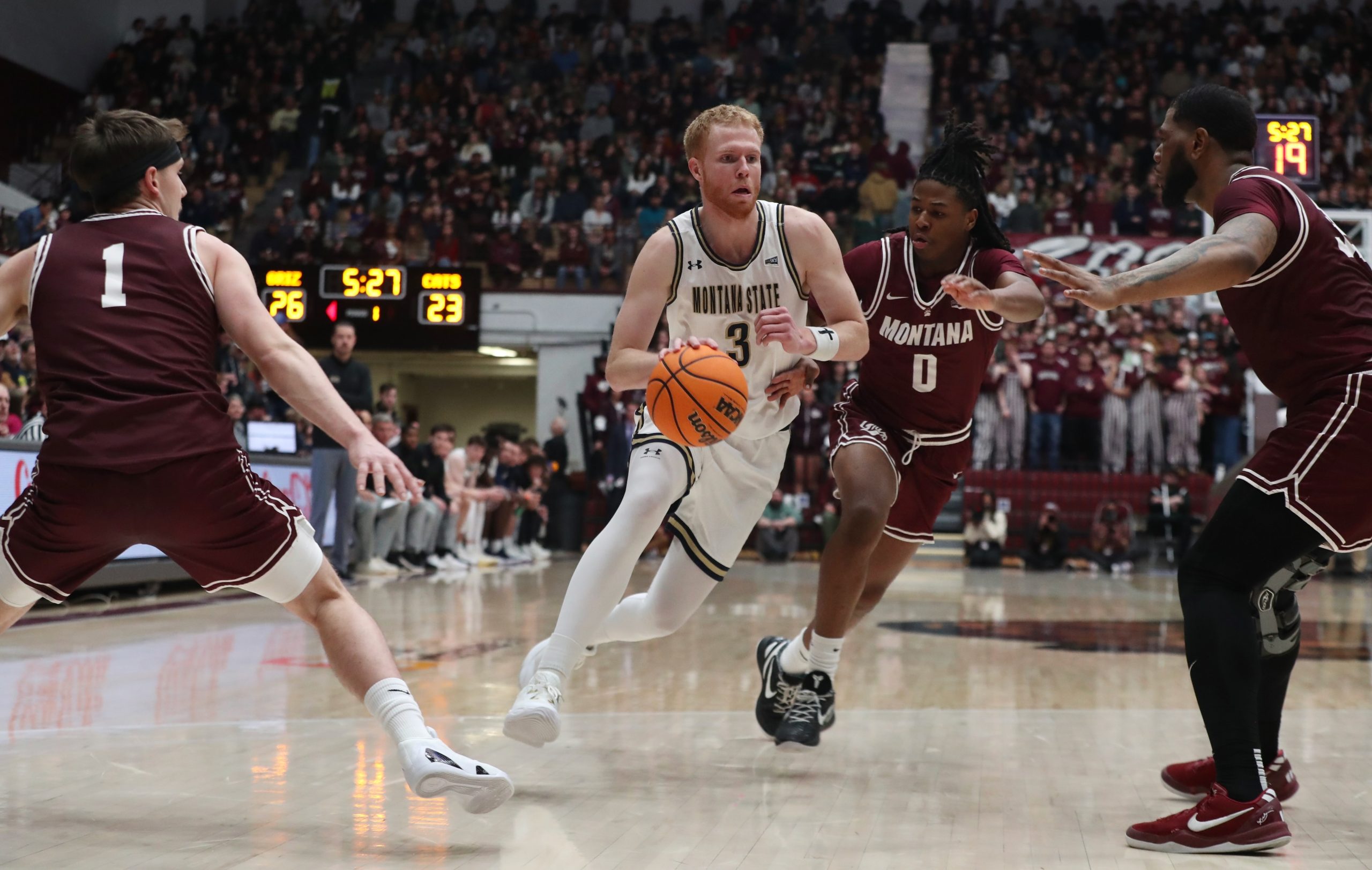
Montana has largely dominated Montana State in the rivalry during the modern era. Under DeCuire, UM is 15-5 against MSU.
Montana’s 11th-year head coach is also closing in on history. His next victory will give him 221 wins at Montana, tying George “Jiggs” Dahlberg for the most in the history of Griz hoops. Dahlberg, who UM’s basketball arena is named after, led Montana from 1937 until 1955.
“It means I have good players, it means I’ve had a good staff, good staff members that have been here with us prior,” DeCuire said. “When you talk leadership, if you surround yourself with leaders, you’ll be successful. I think I’ve done that. This isn’t me pursuing a record, it’s our staff pursuing a record, it’s everyone who has been on the staff the past 11 years, all the guys who have played for us, that have all been in pursuit of this.”
DeCuire, a former Griz point guard himself who ended his career as Montana’s all-time leader in assists, went on to give credit to former Griz coach Blaine Taylor for recruiting him to Montana in the late 1980s and former head coach Stew Morrill for coaching him during his first season at UM.

DeCuire also played for Taylor when the Missoula native (and former Griz point guard) took over as UM’s head coach. DeCuire also acknowledged getting into the hallowed Griz coaching tree by working for Mike Montgomery as an assistant at Cal for six seasons before taking over at his alma mater ahead of the 2014-2015 season.
Now DeCuire has a chance to lead his team to a fourth Big Sky regular-season title. That would give DeCuire more banners than Judd Heathcote, Jim Bradenburgh, Montgomery, Morrill, Taylor, Larry Krystkowiak or Wayne Tinkle.
The next step toward that achievement comes in the form of a Montana State team that’s 10-2 at home this season. And point guard play will certainly play a huge role in whoever comes out on top.
“The statement to the guys on Friday was, ‘moving forward, every game is a championship game and we have to treat them all that way. Don’t look back, just look forward.’”



